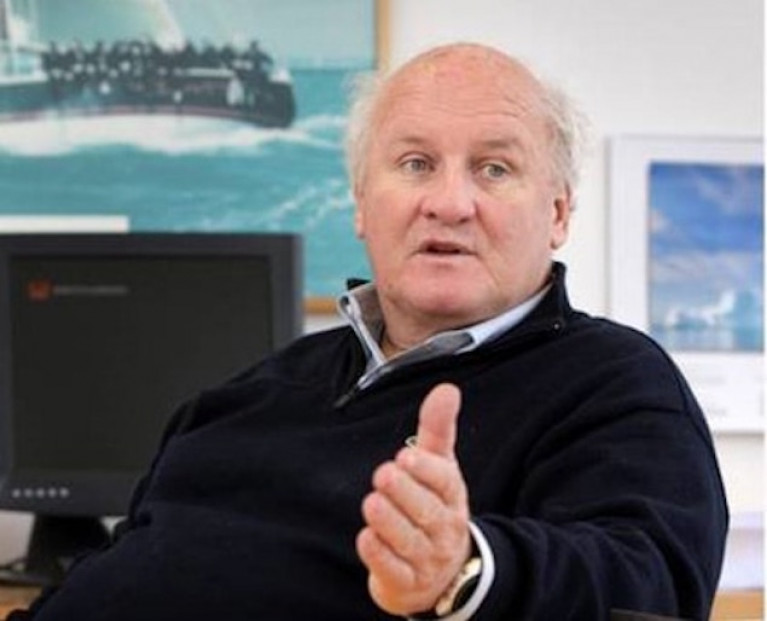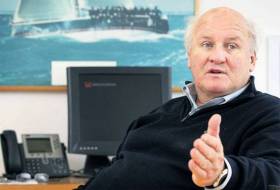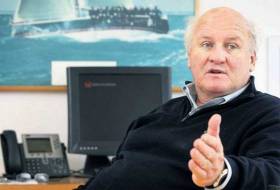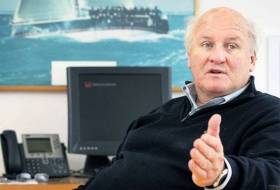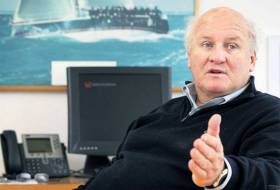Displaying items by tag: Colm Barrington
Irish Sailing Foundation's Colm Barrington Seeks Re-election as Olympic Federation of Ireland Vice President
The Irish Sailing Foundation Chairman Colm Barrington will stand for election as First Vice President of Olympic Federation of Ireland's Executive Committee, a position he has held since March 2017.
As regular Afloat readers will know, Barrington was instrumental in changing the OFI towards an athlete focussed organisation, introducing proper corporate governance and putting in place an appropriate professional management team.
The OFI Extraordinary General meeting will be held on 8 December 2020 and voting will open on the morning of the EGM at 11:30hrs (8 December 2020) and will close at 14:00hrs. The EGM will take place by zoom at 6 pm on 8 December 2020.
Founder and current Chair of the Irish Sailing Foundation, Barrington has raised significant philanthropic funding for high-performance sailing programmes that funded Irish Sailing’s High-performance Centre in Dun Laoghaire, Co Dublin.
Barrington was a competitive dinghy and keelboat sailor in Ireland, Continental Europe, UK and US for over 50 years.
See Barrington's full biographgy as listed by the OFI here.
Colm Barrington Formally Relinquishes Irish Sailing’s Olympic Seat For Patrick Coveney
Colm Barrington has formally stepped down as chair of Irish Sailing’s Olympic Steering Group, as The Irish Times reports.
Greencore chief executive Patrick Coveney will succeed in the role that Barrington announced he would leave after the Rio 2016 games, at which Annalise Murphy won silver for Ireland in the Laser Radial.
Barrington — who says he considers Annalise’s medal win the high point of his 12-year tenure — was elected as first vice president of the Olympic Council of Ireland in February last year.
His successor, brother of Tánaiste Simon Coveney, is no stranger to the water as a member of the Royal Cork Yacht Club. The family previously owned a round-the-word One Tonner, Golden Apple. Coveney was a keen Enterprise dinghy helmsman sailing from Crosshaven in the 1980s.
Barrington told the newspaper that while there is a good system to bring young sailors through to international competition there is "a long way to go".
Not least are the current funding issues facing the new Chairman that led to the recent shut down of the 420 Academy, Optimist squad and Topper squads.
The senior team has also been refocussing with just under 600 days to Tokyo 2020 where Irish boats have yet to qualify.
Sailing's Colm Barrington was voted with a clear majority to the position of first Vice–President at last night's ground breaking Olympic Council of Ireland (OCI) egm at the Conrad Hotel in Dublin.
After three decades of rule by former president Pat Hickey, a new era in the Council dawned last night with landslide victories for swimming's Sarah Keane and Barrington.
The Irish Sailing Association (ISA) nominated Barrington (70) as a candidate for 'First Vice President'. The Irish sailing champion and former Aer Lingus Chairman ran in support of Sarah Keane's bid to be OCI President and her reform programme.
Big reforms are on the way if Barrington's pre-election pledges in an Afloat.ie interview is anything to go by. Barrington was elected by a clear majority of 29 votes, the same as Keane.
Speaking after last night’s election result Keane commented “I feel humbled and privileged to have been elected as President of the OCI this evening. I am grateful for the support and confidence shown to me by the Olympic Sports Federations and I look forward to working with them the other newly elected officers and Executive Committee members to reform and rebuild the OCI after what has been a very difficult few months for the Olympic movement in Ireland.
Barrington, a member of the Royal Irish Yacht Club, served for 12 years as Chairman of the ISA's Olympic Group stepping down after Rio.
Barrington continues to Chair the Irish Sailing Foundation, the Olympic fundraising body for sailing, established by him in 2015.
He maintains Ireland’s success rate at the Olympic Games is not good enough, particularly for a 'sports–mad and relatively well–off nation'. Read his interview with Afloat.ie here
OCI Election: Irish Sailing's Colm Barrington Seeks 'Athlete Rather than Official Centred Organisation'
The Irish Sailing Association (ISA) has nominated Colm Barrington (70) as a candidate for 'First Vice President' in February's election of the Olympic Council of Ireland (OCI) Executive Committee. The Irish sailing champion and former Aer Lingus Chairman says he is running 'in support of Sarah Keane's bid to be OCI President and her reform programme'.
The OCI election is shaping up to be a battle between the old guard and those seeking change for an organisation in crisis. For the first time since 1989, long-standing president Pat Hickey will not be running in the election.
Sarah Keane, William O’Brien and Bernard O’Byrne are the candidates who will fight it out for the OCI's top position at next month's meeting.
Barrington, a global aircraft leasing chief, is in no doubt about the work ahead if elected and pulls no punches about the current state of the OCI in the Afloat.ie interview below. His experience is that 'the OCI has done nothing to support the efforts of our high performance sailors'. He also says 'the successes of Annalise and the rest of the team in Rio, and at previous Olympic Games, were despite the OCI and not because of anything they did for us'.
Sailing's sole nomination for the XXXII Olympiad – Tokyo, Japan 2020 executive is running against Irish Taekwondo's Martin Fleming for the First Vice President role.
Barrington, a passionate Irish sports fan, served for 12 years as Chairman of the ISA's Olympic Group stepping down after Rio. He continues to Chair the Irish Sailing Foundation, the Olympic fundraising body for sailing, established by him in 2015.
He maintains Ireland’s success rate at the Olympic Games is not good enough, particularly for a 'sports–mad and relatively well–off nation'.
Irish Sailing's candidate also says he hopes the terms of office of future OCI officials and Executive Committee members will not exceed eight years.
The election will take place on Thursday, 9th February 2017 at the Conrad Hotel, Dublin.
Read the interview below
Afloat.ie: What future direction do you think the OCI should go in?
Colm Barrington (CB): I am passionate about sport and, particularly, about achieving international success. Ireland’s success rate at Olympic Games is not good enough, particularly for a sports-mad and relatively well-off nation. In Rio, Ireland’s two medals put us 62nd in the medals table out of the 87 countries that won any medals. The OCI needs to respond to that situation and assist our athletes, their coaches, their families and their federations to be more successful. Olympic success is the best way to promote the Olympic movement in Ireland. The OCI needs to up its game in this regard.
Assistance needs to include helping federations to bring in the right people for both governance and management and to develop high performance programmes with them. It also needs to include providing appropriate logistical and management support at Olympic Games and focusing on maximising financial support that can be passed on to the athletes and their programmes. The OCI must focus on athletes rather than on itself and its officials. Simple changes, such as making Olympic tickets available to athletes and their families, can help the Olympic movement greatly.
While my main objective would be to help make the OCI a truly athlete centred organisation, I would also aim to bring my corporate experience to help institute appropriate governance in line with best international practise. Specifically, I would plan to oversee implementation of the recommendations of the Deloitte Report.
It is also important that the OCI becomes an important part of Irish social life and an influential supporter of the many benefits of Olympic sport in this country. In this regard the performance and results of the OCI and the GAA are poles apart. I would hope to use my relationships at all levels of Irish and international society to help restore the OCI’s reputation and to enhance its profile with commercial sponsors.
What lessons from your successful work as Chair of the ISA's Olympic Group do you think could be useful for the OCI and other Irish Olympic sports?
CB: I am proud to have witnessed Ireland's high performance sailing programme develop from ad hoc talent management into a high performance system which has produced numerous international successes at junior, intermediate and senior levels and, finally, Annalise’s Olympic medal in Rio after her near-miss in London.
In my experience the Olympic Council of Ireland has done nothing to support the efforts of our high performance sailors. The successes of Annalise and the rest of our team in Rio, and at previous Olympic Games, were despite the OCI and not because of anything they did for us. Indeed, at Rio their arrangements for accommodation, transport and accreditations were useless and we had to make our own parallel accommodation and transport arrangements at an additional cost of €70,000. This was a big part of our 2016 budget and has resulted in corresponding cutbacks in other parts of our HP programme. And it was all as a result of the OCI’s unwillingness to respond to our reasonable requests and to focus on what was needed to support our athletes as they tried to achieve success. I assume that they treated other athlete groups in a similar manner.
The OCI needs to help our sporting federations to institute appropriate programmes to support athletes’ ambitions, to help get the right people to run the programmes and to maximize the funding support that is available for our athletes.
Given the recent changes recommended in the Deloitte report do you consider your nomination to be an engine for change?
CB: There are significant changes required in its governance in order to restore the reputation of the OCI and to ensure that it is regarded among the most respected sports organisations in the country. A strong and respected OCI will be of huge benefit to its member federations and is also vital in maximising the potential of Irish high performance athletes on the world stage. I hope that I can help make this happen. There are many recommendations in the Deloitte report, but I hope that one of their main recommendations - that terms of office of OCI officials and Executive Committee members should not exceed eight years - will be taken seriously by the federations and will apply to the upcoming election.
OCI vice-presidents can go forward for nomination to the Presidency every four years. Is this a role you would consider?
CB: I am running for the position of First Vice President in support of Sarah Keane bid to be President and in support of her reform programme. I believe that I can make my best contribution to the OCI and its member federations by helping change the OCI’s focus to an athlete rather than official centred organisation, by improving governance and by creating openness and fairness. I have no aspirations to be President.
Download the OCI's List of Nominations for Election of Officers and Executive below.
Read more about Colm Barrington's role in Irish Olympic sailing in Afloat's pre–Rio interview here.
Irish Olympic Sailing Chief Colm Barrington On Rio, Funding & Ireland's 'Elusive' Sailing Medal
After Rio, Colm Barrington will step down as Chair of Sailing's Olympic Steering Group but remains in a fundraising role for the sport. Here, in answers to questions from Afloat.ie, he outlines his hopes for next month's Olympic Regatta, the future funding arrangements for Irish Olympic sailing and explains what an 'elusive' Olympic sailing medal might mean.
AFLOAT (A): In your tenure as Chair of the Olympic Steering Group, there have been some excellent performances in terms of high Performance sailing to the extent that we now tend to expect podium finishes at both youth and senior levels. Going to Rio, have these results helped with generating tangible support for the current Olympic campaigns?
COLM BARRINGTON (CB): Most importantly, the results achieved through the ISA Performance Pathway have resulted in greater competition for Olympic places and so have helped to up everyone’s game. This has been most evident in the Laser and Laser Radial classes where we had competition for places from and between Pathway sailors. As the Pathway sailors mature we hope that this trend will increase so that we have several young Irish sailors competing in the Olympic classes that are targeted.
As regards financial support, in every Olympic cycle interest peaks around the time of the Olympics. Sport Ireland has assessed our progress on a year by year basis and even though results have been really strong at Youth and Senior level it has not had an impact in terms of funding increases. However, this has to be viewed in terms of the overall level of government support for sport which has remained static over the last four years in the difficult economic circumstances. Relatively speaking sailing has done well in comparison with other sports. With the number of squads in our Pathway increasing it means there is no tangible increase in funding at an individual level even though more sailors are now benefitting from the programme.
(A) How do you see the role of the Irish Sailing Foundation in developing a sustainable and repeatable support structure?
(CB): The Irish Sailing Foundation was set up to support, develop and make sustainable a repeatable structure that is already in place with the ISA Performance Pathway. The Pathway is the project that James O’Callaghan and his team of coaches have implemented over the last ten years. The success of this programme is clear to see, in the last four years we have medalled three times at youth worlds. Sixty-six per cent of the RIO Olympic team are graduates from the Academy and another very pleasing statistic is that fifty percent of the team are female. It is now our job to make sure these talented youngsters progress. The goal of the Foundation is to widen the access to this Pathway, to help the progression along the pathway by providing the finance to allow sailors populate the structures regardless of their means and to achieve success at European, World and Olympic level. The motto of the Foundation is “From Pier to Podium”. I hope that the funds raised by the Foundation will give many more young people greater access to the Pathway and to High Performance sailing.
(A) Does the support extend to Paralympics?
(CB): The Foundation will consider disposition of funds to all High Performance sailing, including Paralympics. As you are aware, there is no Paralympic discipline in the 2020 Olympics and so the whole future development of High Performance Paralympic sailing is somewhat unclear right now.
(A) What would be the impact of a Rio medal – both in terms of a medal and in personal terms?
(CB): I believe that the impact on sailing in Ireland of an Olympic medal – or two – would be hugely positive. Ireland loves winners in sport and takes a huge interest in sports where we have winners. Take the public interest generated in women’s boxing after Katie Taylor began winning medals and in women’s rugby after we beat New Zealand. Ireland has not won a sailing medal at the Olympics since 1980 and despite the fact that our sailors have won World Championships, European Championships and World Cup medals in recent years, sailing is still very much below the public horizon. We have the potential to deliver a medal which would help attract a wider audience to what it is we do and why we are so passionate about it. The success Annalise Murphy had in London has already had an effect in the number of young girls with Olympic ambitions. A medal would bring sailing to the attention of a wider group, which would benefit our clubs, our sailing schools, our training programmes, the ISA and the sailing community in general. It would make all of us sailors feel great!
Personally I would be delighted if we could get that elusive medal. I would be particularly delighted for the athletes involved, for their families, for their trainers, for their mates in the training programmes and for all those who have supported them through the many hard years of training and competing, both financially and emotionally. This is my last chance as chair of the OSG as I will step down after twelve years shortly after the games end in Rio. I will remain as chair of the Foundation. If a medal in Rio could also help us achieve the goals of the Foundation then that would be an extra bonus.


























